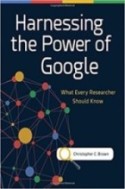by infonistaadmin | Sep 4, 2017 | LIS Skills, LIS Students, Professional Development, Research Resources, Reviews
 In his excellent guide Harnessing the Power of Google: What Every Researcher Should Know (Libraries Unlimited, 2017), author Christopher C. Brown asserts that:
In his excellent guide Harnessing the Power of Google: What Every Researcher Should Know (Libraries Unlimited, 2017), author Christopher C. Brown asserts that:
Librarians often hear from students that their instructor said not to use Google in their research. I believe that what is meant in most cases is that students shouldn’t only use resources that they just found with simple Google searches. Too many times students cite Wikipedia as an authority for their research. But what this book is arguing is that there is a proper place for Google in academic research.
Not only does the author argue his point successfully, he does every academic librarian and serious researcher the favor of showing them how to use Google so that it truly can become a credible component of rigorous scholarly and business research. (more…)
by infonistaadmin | Dec 13, 2016 | LIS Career Options, LIS Skills, LIS Students
 One of the questions most frequently asked by students is whether to specialize in a specific area (say cataloging or government documents) or graduate as a generalist, someone who has a broad range of skills but is not an expert in any. Ask five seasoned practitioners for their advice here, and you’re likely to get five well-reasoned, passionate, and completely different answers.
One of the questions most frequently asked by students is whether to specialize in a specific area (say cataloging or government documents) or graduate as a generalist, someone who has a broad range of skills but is not an expert in any. Ask five seasoned practitioners for their advice here, and you’re likely to get five well-reasoned, passionate, and completely different answers.
The reason is, there are benefits and disadvantages to both approaches. (more…)
by infonistaadmin | Nov 29, 2016 | LIS Skills
 Some of us have the presentation design sense of a turnip. (Raised hand here.)
Some of us have the presentation design sense of a turnip. (Raised hand here.)
Which is why I was ecstatic when I decided to explore SlideShare after it had officially become another LinkedIn property, and found that it offered a decent collection of tips, tricks, and tools.
True, Amazon shows an impressive 239 title results when searched for “SlideShare for Dummies,” but none of those are actually a book called Slideshare for Dummies (always my starting point….). So as an alternative, I’ve worked my way through SlideShare’s “Get Started” coaching materials and found them to actually be pretty helpful for those of us in the design-challenged category. It’s really, really basic information, but a starting point.
What’s Worth Checking Out (more…)
by infonistaadmin | Oct 11, 2016 | LIS Career Strategy, LIS Skills
 If we peer into the future of LIS careers, are there indicators that might signal what types of LIS jobs are most at risk for being automated or taken over by smart machines? (See Will smart machines compete for LIS jobs for more background on this issue.)
If we peer into the future of LIS careers, are there indicators that might signal what types of LIS jobs are most at risk for being automated or taken over by smart machines? (See Will smart machines compete for LIS jobs for more background on this issue.)
Although automation is likely to impact different areas of LIS work in terms of when, and by how much, these changes disrupt our assumptions, authors Thomas Davenport and Julia Kirby suggest 10 job characteristics likely to result in worker replacement (or displacement) through automation in their Only Humans Need Apply: Winners and Losers in the Age of Smart Machines (HarperCollins, 2016).
Job characteristics that lend themselves to LIS job automation
According to the authors, the 10 job characteristics most likely to suggest it’s time to start watching your back are: (more…)
by infonistaadmin | Sep 6, 2016 | LIS Skills, Reviews
 In January 2011, the National Science Foundation began requiring that all grant applications include a data management plan.
In January 2011, the National Science Foundation began requiring that all grant applications include a data management plan.
Immediately, librarians at research institutions throughout the country found themselves on the front lines of a new professional discipline that sort of aligned with their skills… or at least was something they could probably figure out. (more…)
 In his excellent guide Harnessing the Power of Google: What Every Researcher Should Know (Libraries Unlimited, 2017), author Christopher C. Brown asserts that:
In his excellent guide Harnessing the Power of Google: What Every Researcher Should Know (Libraries Unlimited, 2017), author Christopher C. Brown asserts that:



